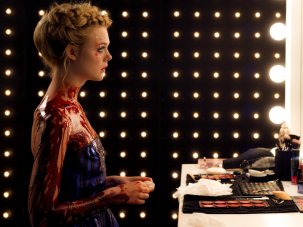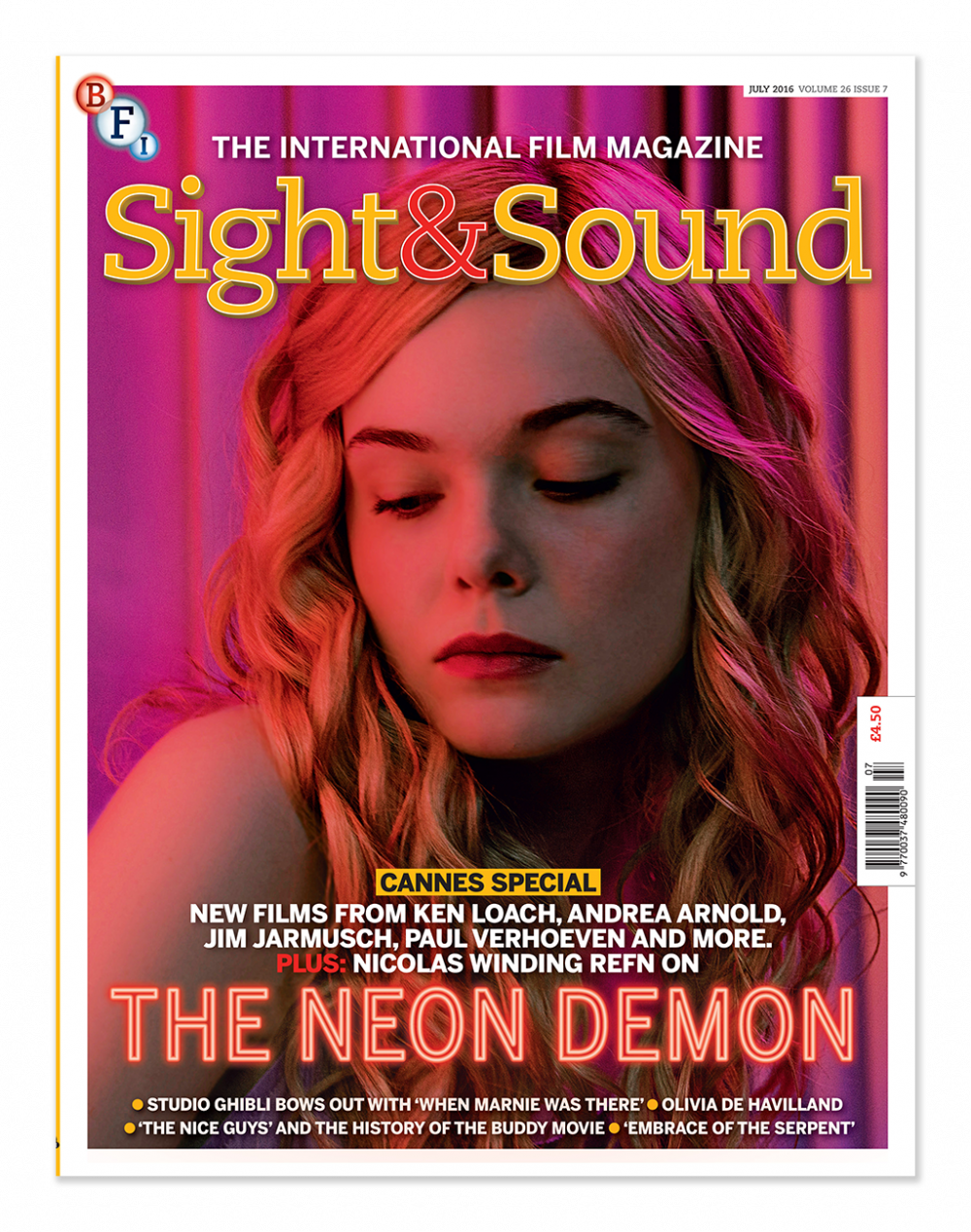
It was probably the best Cannes line-up for over a decade, with great films from the established and new directors, yet it ended in critical bemusement over the more eccentric of George Miller’s jury’s decisions.
Posted to subscribers and available digitally 3 June
→ Buy a single print issue
→ Access the digital edition
→
On UK newsstands 7 June
No one on our team would quibble over Ken Loach’s magnificent Palme d’Or winner I, Daniel Blake, but our in-depth reports compare and contrast other jury favourites (like Asghar Farhadi’s The Salesman and Xavier Dolan’s It’s Only the End of the World) with films the critics loved such as Maren Ade’s Toni Erdmann and Paul Verhoeven’s Elle. We give praise to Jury Prize-winner Andrea Arnold’s American Honey, and the films that shared the Best Director prize, Cristian Mungiu’s Graduation and Olivier Assayas’s Personal Shopper – whose star Kristen Stewart was the face of Cannes this year. We also celebrate the discoveries of the Director’s Fortnight, such as Claude Barras’s animation My Life as a Courgette and French-Moroccan director Houda Benyamina’s terrific banlieu-set tale of female ambition Divines.
First among our other features is Cannes controversy figure Nicolas Winding Refn’s The Neon Demon, with our cover star Elle Fanning. Refn defends his visually precise, grim fashion-based fairy tale, saying “I wanted to make a film about purity and preying upon purity… a film about the insanity of beauty.” He praises his female co-writers and female DP as being essential to this particular creation.
What may be the final in-house feature from Studio Ghibli, Yonebarashi Hiromasa’s When Marnie Was There, prompts a rare interview with Yonebayashi. He reveals that it was Miyazaki Hayao’s interest in English children’s fiction that caused him to adapt Joan Robinson’s story of Anna, an orphan girl sent to live with relatives on the north Norfolk coast, where she forges a private bond with a mysterious kindred spirit, Marnie. Yonebayashi indeed initially turned the project down because of the difficulty of representing Anna’s inner feelings; happily he found a way to crack the adaptation, moving the story to Hokkaido but keeping both its grey weather and its blonde protagonist, a Ghibli novelty.
Olivia de Havilland was the perfect romantic foil for Errol Flynn in adventure yarns until she landed the part of Melanie in Gone with the Wind and won an Oscar nomination, after which she took on Warner Bros to gain control over the quality of films she was offered – and won. Our profile of De Havilland traces her epic career.
You won’t see a more unique film than Ciro Guerra’s Embrace of the Serpent and yet it has so many echoes of upriver films like Aguirre, Wrath of God and Apocalypse Now! In our interview with the director he reveals the vivid ethnographic background to this dreamlike Amazonian culture-clash saga.
What better occasion to look back on the classic American buddy movie could there be than a new film by Shane Black, The Nice Guys? The film is, of course, about private investigators in 1970s L.A. and is steeped in the pulp fiction of Raymond Chandler, Dashiell Hammett and less famous authors of gumshoe tales. Our study is less about the mean streets than the shared beats, the chemistry that makes two back-to-back bickerers the most entertaining force for good – or at least amorality.
Features
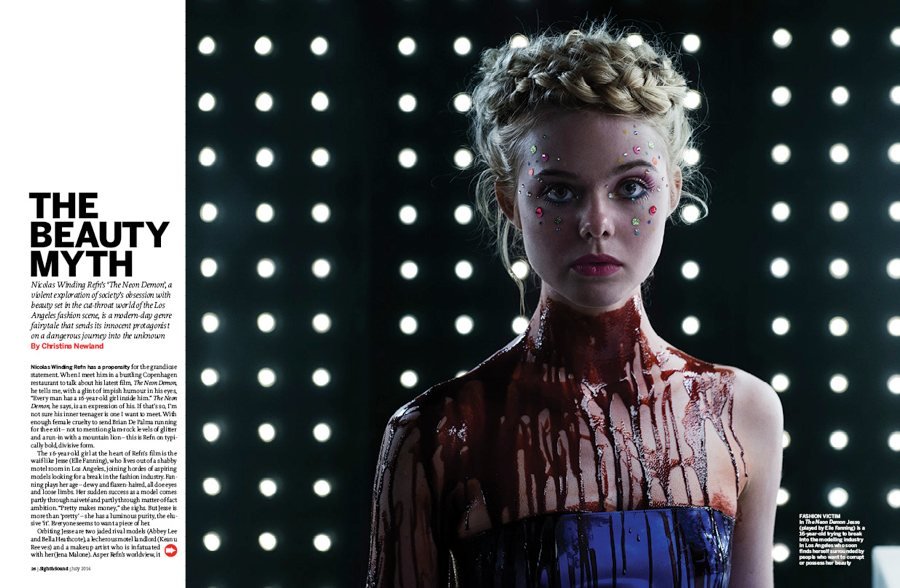
The Beauty Myth
Nicolas Winding Refn’s The Neon Demon, a violent exploration of society’s obsession with beauty set in the cut-throat world of the Los Angeles fashion scene, is a modern-day genre fairytale that sends its innocent protagonist on a dangerous journey into the unknown. By Christina Newland.
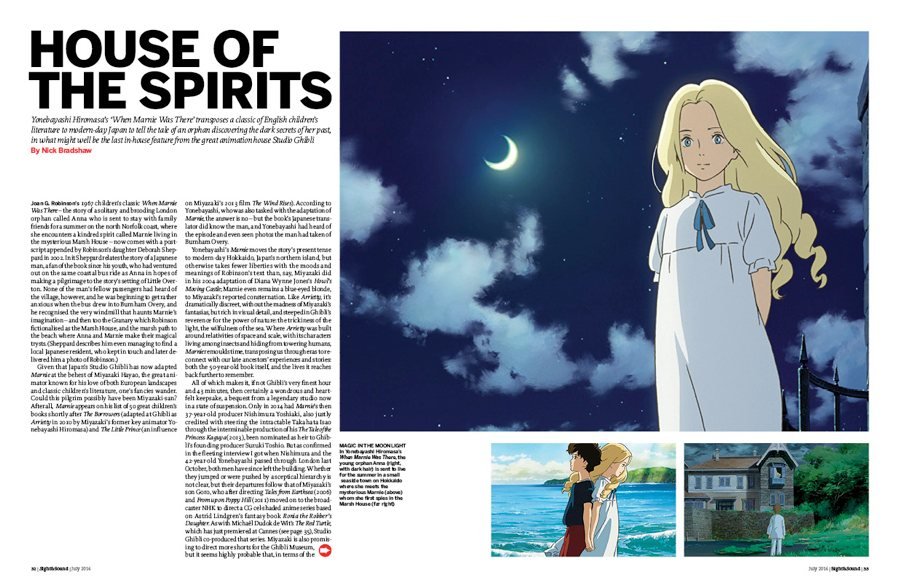
House of the Spirits
Yonebayashi Hiromasa’s When Marnie Was There transposes a classic of English children’s literature to modern-day Japan to tell the tale of an orphan discovering the dark secrets of her past, in what might well be the last in-house feature from the great animation house Studio Ghibli. By Nick Bradshaw.
+ Cast away
For the first time, Studio Ghibli has collaborated with an outside animator, Michaël Dudok de Wit, and his breathtaking The Red Turtle proves a worthy heir to this Ghibli tradition. By Isabel Stevens.

Steel and Silk: the Life of Olivia de Havilland
On the eve of her 100th birthday, we celebrate the career of Olivia de Havilland, the last of the great pre-World War II Hollywood stars and a woman who was not only a fabulous performer but also a thorn in the side of the studios, winning a key legal battle for which every actor in Tinseltown owed a debt of gratitude. By Farran Smith Nehme.
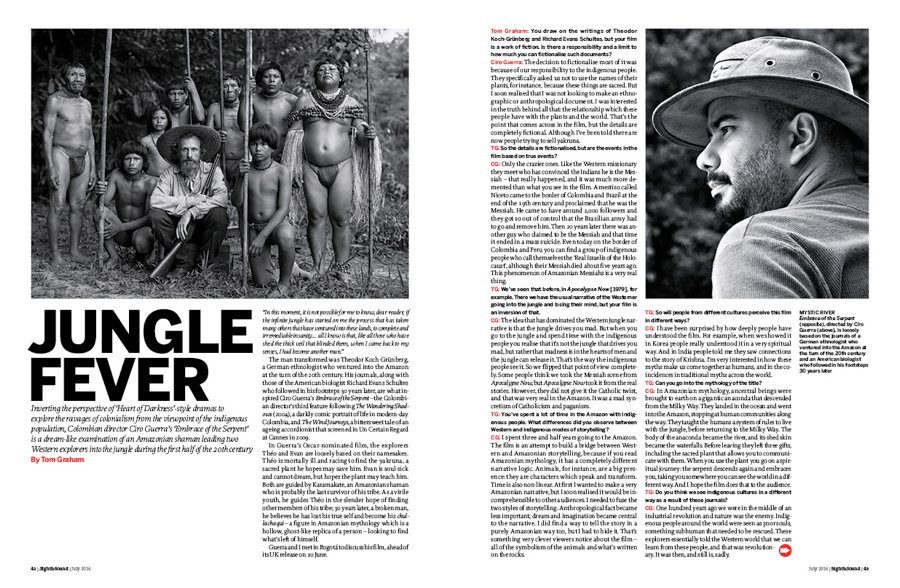
Jungle Fever
Inverting the perspective of Heart of Darkness-style dramas to explore the ravages of colonialism from the viewpoint of the indigenous population, Colombian director Ciro Guerra’s Embrace of the Serpent is a dream-like examination of an Amazonian shaman leading two Western explorers into the jungle during the first half of the 20th century. By Tom Graham.
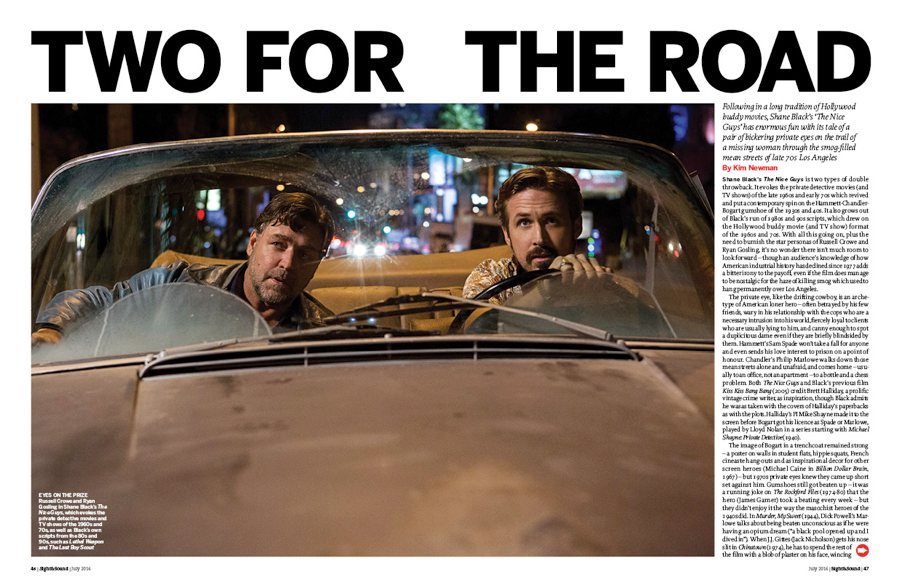
Two for the Road
Following in a long tradition of Hollywood buddy movies, Shane Black’s The Nice Guys has enormous fun with its tale of a pair of bickering private eyes on the trail of a missing woman through the smog-filled mean streets of late 70s Los Angeles. By Kim Newman.
Editorial
Narrative hugs versus no hugs
Rushes
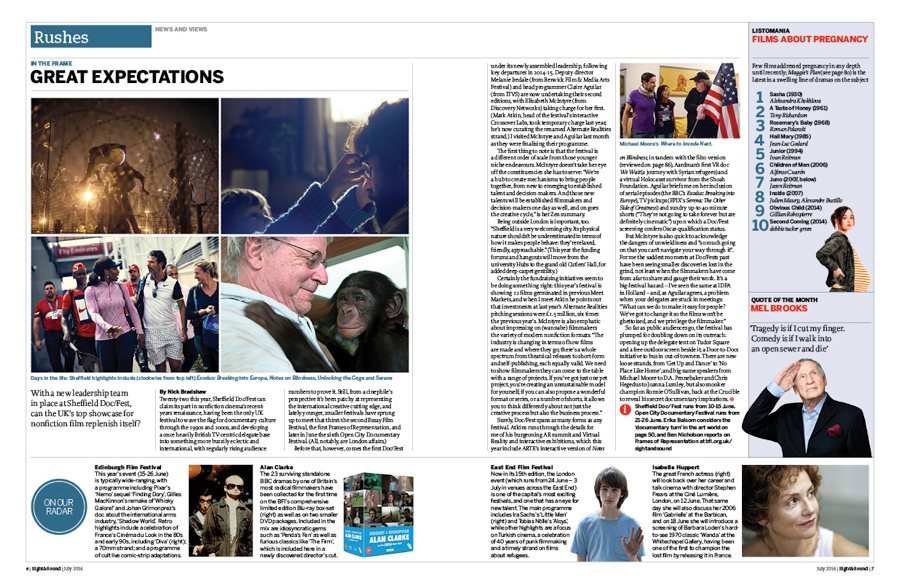
In the frame: Great expectations
With a new leadership team in place at Sheffield Doc/Fest, can the UK’s top showcase for nonfiction film replenish itself? By Nick Bradshaw.
Listomania: Films about pregnancy
Object lesson: Under the skin
Furs in films are a sign of both success and corruption, with the hint that something must have been sacrificed in order to get one. By Hannah McGill.
The five key…: Fashion industry films
If any business is more glamorous (and shallower) than film, it’s fashion – no wonder Hollywood keeps looking to it for inspiration. By Abbey Bender.
Interview: In search of lost time
Questions of memory and trauma in Tom McCarthy’s novel Remainder proved fertile terrain for the feature debut of visual artist Omer Fast. By Philip Concannon.
Restoration: Amid the guns below
A restoration of the official record of the British army’s bloodiest day, The Battle of the Somme, is screening to mark the event’s centenary. By Lawrence Napper.
Dispatches: Concerning violence
When it comes to showing violence on screen, particularly if it’s based on real events, filmmakers face a tricky ethical dilemma. By Mark Cousins.
The Industry

Development tale: Ghostbusters
Putting together a remake of a beloved and highly commercial comedy shouldn’t be too much of a problem, right? Wrong. By Charles Gant.
The numbers
Mustang and Turkish films at the UK box office. By Charles Gant.
Festivals
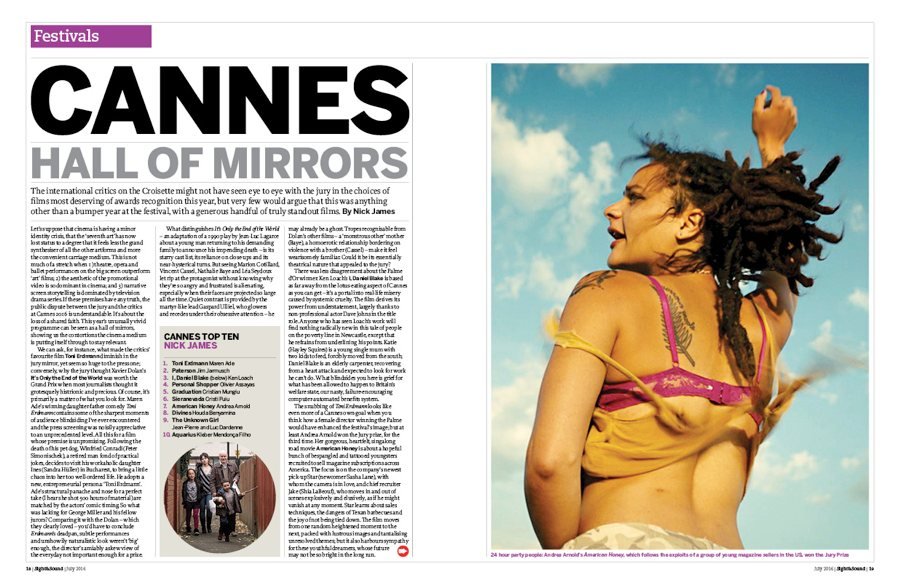
Cannes: Hall of mirrors
The international critics on the Croisette might not have seen eye to eye with the jury in the choices of films most deserving of awards recognition this year, but very few would argue that this was anything other than a bumper year at the festival, with a generous handful of truly standout films. By Nick James.
Cannes’ sidebars: High times
Away from the main Competition, the festival sidebars proved a rich hunting ground for talent, with a number of promising debuts. By Isabel Stevens.
Wide Angle
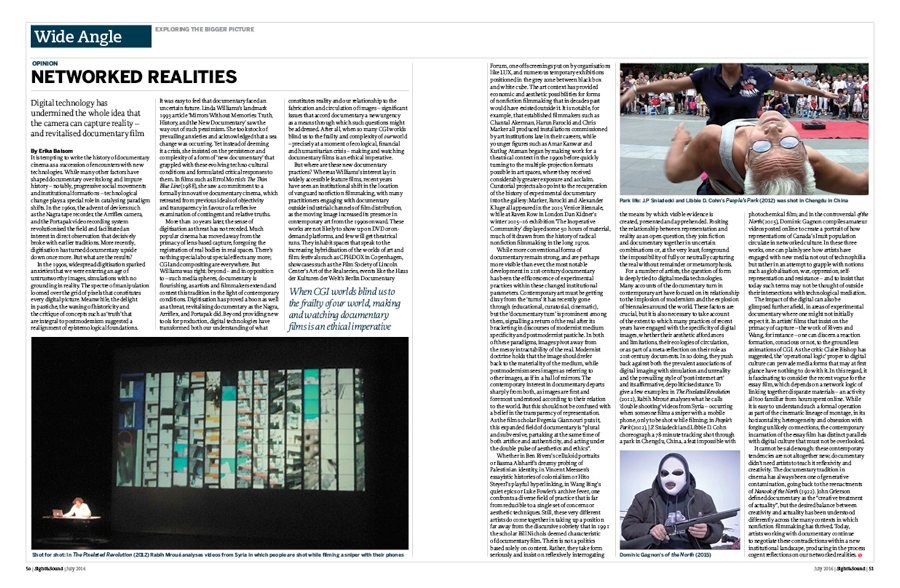
Opinion: Networked realities
Digital technology has undermined the whole idea that the camera can capture reality – and revitalised documentary film. By Erika Balsom.
Soundings: Smoke signals
In film after film, The Platters’ classic version of Smoke Gets in Your Eyes is a reminder – mordant or romantic – that love is blind. By Sam Davies.
Primal screen: the world of silent cinema
Filmmakers and exhibitors are dipping into silent film’s bag of tricks to find new ways of tempting audiences. By Pamela Hutchinson.
Profile: The modern antiquarian
For 60 years, the autodidact Paolo Gioli has been tinkering with and reinventing cinema, eyes fixed firmly on the past. By Nick Pinkerton.
Festival: Peace initiative
Seventy years ago, the first Cannes festival after World War II unveiled a handful of classics, and pointed the way to a new world order. By Olaf Möller.
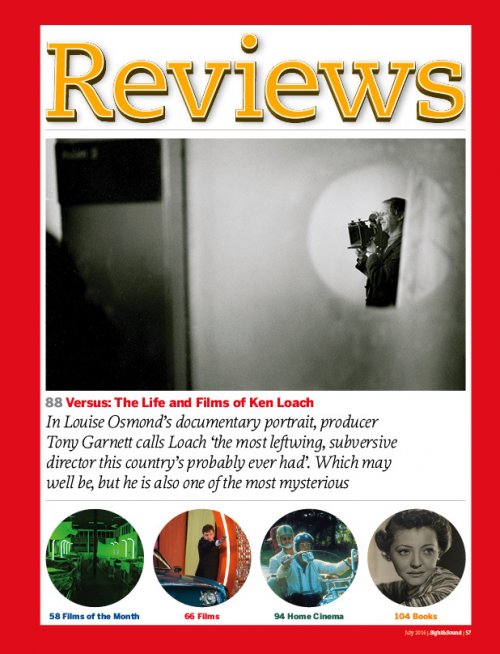
Our Reviews section
Reviews
Films of the month
Cemetery of Splendour
Fire at Sea
No Home Movie
Remainder
plus reviews of
Adult Life Skills
Alice Through the Looking Glass
Angry Birds
Bad Neighbours 2
Bang Gang (A Modern Love Story)
Barbershop: A Fresh Cut
Baskin
Blood Orange
The Boss
Captain America: Civil War
The Colony
Crazy About Tiffany’s
The Darkness
Elvis & Nixon
Embrace of the Serpent
Holding the Man
A Hologram for the King
The Keeping Room
Learning to Drive
Long Way North
Maggie’s Plan
ma ma
The Measure of a Man
Miracles from Heaven
Misconduct
Money Monster
Mon roi
Mother’s Day
The Nice Guys
Notes on Blindness
The Silent Storm
Tale of Tales
Versus: The Life and Films of Ken Loach
The Violators
When Marnie Was There
Where to Invade Next.
X-Men: Apocalypse
Home Cinema features
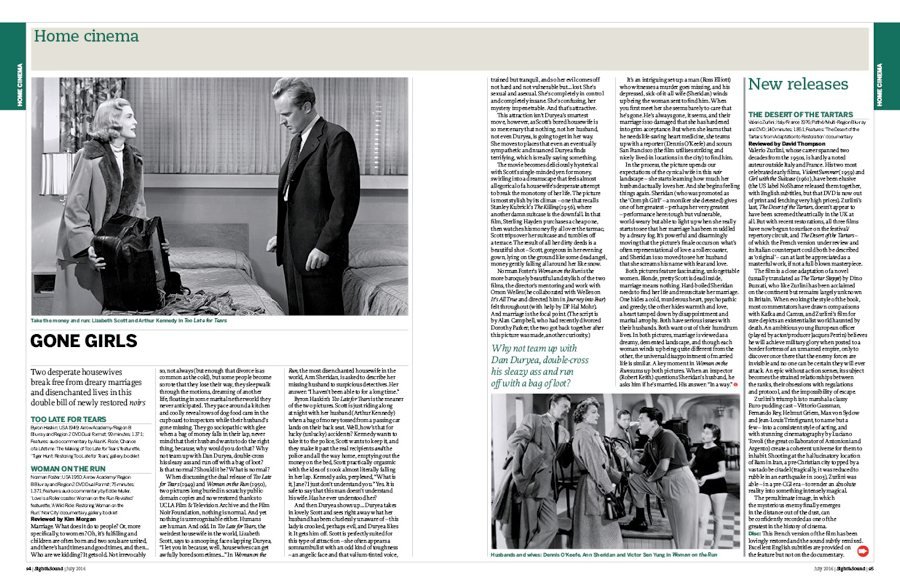
Our Home Cinema section
Gone girls: Too Late for Tears and Woman on the Run
Two desperate housewives break free from dreary marriages and disenchanted lives in this double bill of newly restored noirs. By Kim Morgan.
Revival: The Last Command
From grapevine to screen: how Josef von Sternberg turned Hollywood hearsay into an epoch-hopping masterpiece. By Pamela Hutchinson.
Revival: Hou Hsiao-Hsien Early Works
A trio of early features shows Hou Hsiao-Hsien forging a path to maturity and asserting his own directorial style. By Tony Rayns.
plus reviews of
The Desert of the Tartars
Easy Rider
Forbidden Hollywood: Volume 10
In a Lonely Place
Kansas City Confidential
The Kennedy films of Robert Drew & Associates
A Kiss Before Dying
Man with a Movie Camera
1900
Ourselves Alone
Scott of the Antarctic
The Sound Barrier
Three Brothers
Try and Get Me!
Television
Culloden/The War Game
Books
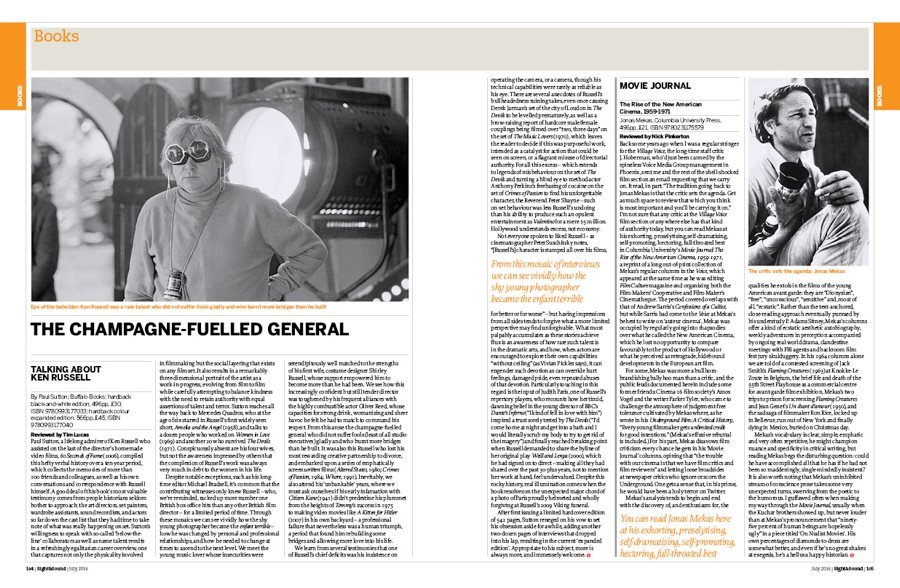
Talking About Ken Russell by Paul Sutton (Buffalo Books) reviewed by Tim Lucas
Movie Journal: The Rise of the New American Cinema, 1959-1971 by Jonas Mekas (Columbia University Press) reviewed by Nick Pinkerton
Sylvia Sidney: Paid by the Tear by Scott O’Brien (BearManor Media) reviewed by Dan Callahan
Her Again: Becoming Meryl Streep by Michael Schulman (Faber & Faber) reviewed by Dan Callahan
Letters
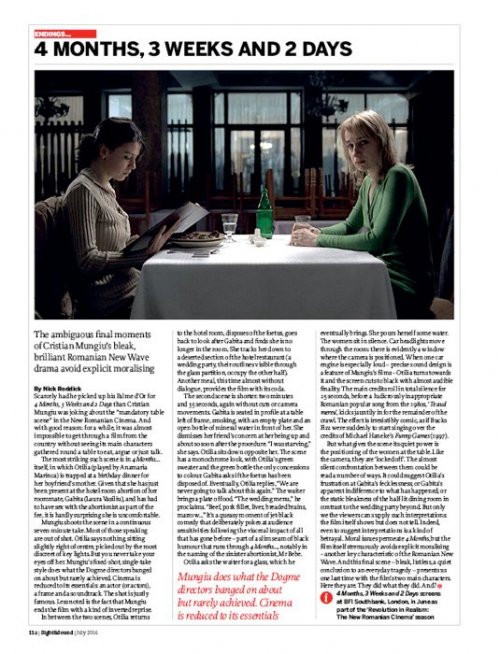
Our Endings section
Virtual reality, private audiences
Two more psychological westerns
Remembering British TV antiheroes
Remembering John Krish
Quentin Tarantino, gateway cinephile
Guy Hamilton, team leader
Endings
4 Months, 3 Weeks and 2 Days
The ambiguous final moments of Cristian Mungiu’s bleak, brilliant Romanian New Wave drama avoid explicit moralising. By Nick Roddick.
Further reading
-
The Digital Edition and Archive quick link
Log in here to your digital edition and archive subscription, take a look at the packages on offer and buy a subscription.




